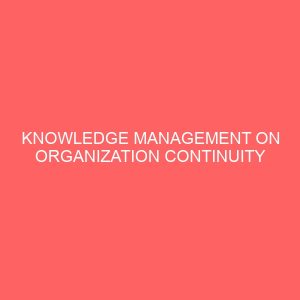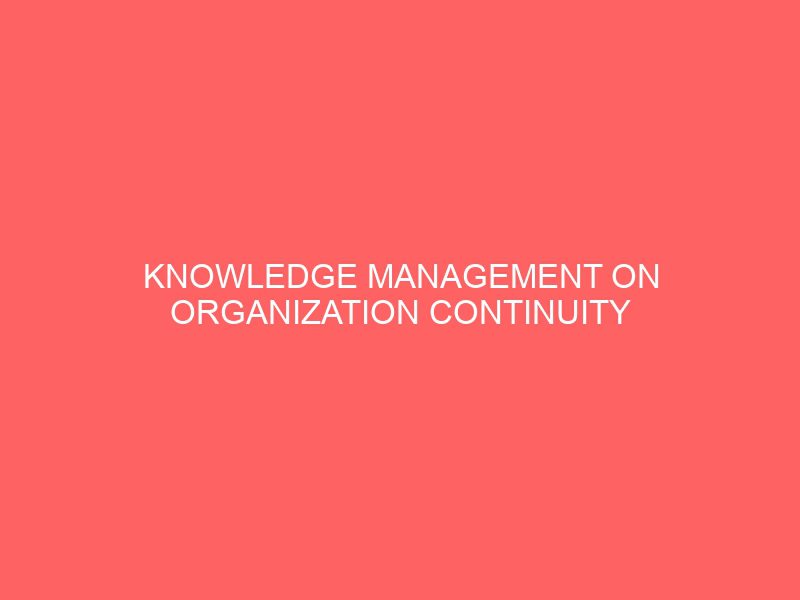Description
CHAPTER ONE
INTRODUCTION
1.1 BACKGROUND TO THE STUDY
Knowledge management is defined as the systematic management of an organization’s knowledge assets to facilitate the attainment of tactical and strategic aims and objectives and the creation of value; it embraces the initiatives, processes, systems and strategies which preserve, stores, assess, share, refine and create knowledge. Knowledge management (KM) is linked with organizational goals and strategy; which ensures that knowledge is managed for the purpose of creating value for the organization. This involves determining the source and nature of knowledge, its relevance to the organization and promoting a culture which enhances learning, sharing, and knowledge creation; providing knowledge to the right people and at the right time; generate new relevant knowledge; to facilitate organizational performance in the light of the organization’s strategic goals while taking into consideration the threat and opportunities facing the organizationThe research therefore seek to investigate knowledgement on organization continuity.
1.2 STATEMENT OF THE PROBLEM
Knowledge management is defined as the systematic management of an organization’s knowledge assets to facilitate the attainment of tactical and strategic aims and objectives and the creation of value; it embraces the initiatives, processes, systems and strategies which preserve, stores, assess, share, refine and create knowledge. Knowledge management (KM) is linked with organizational goals and strategy; which ensures that knowledge is managed for the purpose of creating value for the organization. This involves determining the source and nature of knowledge, its relevance to the organization and promoting a culture which enhances learning, sharing, and knowledge creation; providing knowledge to the right people and at the right time; generate new relevant knowledge; to facilitate organizational performance in the light of the organization’s strategic goals while taking into consideration the threat and opportunities facing the organization
The concept of knowledge management has not been fully and successfully implemented in many organizations due to some associated problems thereby making some executive not appreciative of the program. Factors associated with the difficulty of implementing knowledge management include casual and resultant Causal Failure Factors: Inadequate management support; Improper planning, Inadequate skill of knowledge managers and workers; Lack of performance indicators and measurable benefit; design, Improper organizational structure; coordination, and evaluation; Problems with organizational culture;. The effect include Lack of relevance, quality, and usability ;Overemphasis on formal learning, systematization, and determinant needs ; ;Improper budgeting and excessive costs; Lack of responsibility and ownership; Loss of knowledge from staff defection and retirement Lack of widespread contribution; Improper implementation of technology.The problem confronting the research is to appraise knowledge management on organization continuity.
1.3 OBJECTIVES OF THE STUDY
To determine the effect of knowledge management on organization continuity
1.4 RESEARCH HYPOTHESIS
What is knowledge management?
What is the effect of knowledgement management on organization continuity?
1.5 SIGNIFICANCE OF THE STUDY
The study shall provide a significant appraisal of knowledge management which shall serve a s a vital source of information to managers of organizations
1.6 RESEARCH HYPOTHESIS
Ho The effect of knowledge management on organization continuity is low
Hi The effect of knowledge management on organization continuity is high
1.7 SCOPE OF THE STUDY
The focuses on the appraisal of knowledge management on organization continuity
1.8 LIMITATIONS OF THE STUDY
The research was confronted by some constraints including geographical factor and logistics.
1.9 DEFINITION OF TERMS
KNOWLEDGE MANAGEMENT DEFINED
Knowledge management is defined as the systematic management of an organization’s knowledge assets to facilitate the attainment of tactical and strategic aims and objectives and the creation of value; it embraces the initiatives, processes, systems and strategies which preserve, stores, assess, share, refine and create knowledge. Knowledge management (KM) is linked with organizational goals and strategy; which ensures that knowledge is managed for the purpose of creating value for the organization. This involves determining the source and nature of knowledge, its relevance to the organization and promoting a culture which enhances learning, sharing, and knowledge creation; providing knowledge to the right people and at the right time; generate new relevant knowledge; to facilitate organizational performance
Organizational memory.
Organizational memory can be defined as „the means by which knowledge from the past is brought to bear on present activities, thus resulting in higher or lower levels of organizational effectiveness”,
Organizational learning
Organizational learning as ‘a continuous testing of experience and its transformation into knowledge available to the whole organization and relevant to their mission’,
Organizational performance
Organizational performance is the organization’s ability to attain its goals by using
resources in an efficient and effective manner” (after Daft, 2000); organizational performance is the ability of the organization to achieve its goals and objectives” (after Ricardo, 2001).







